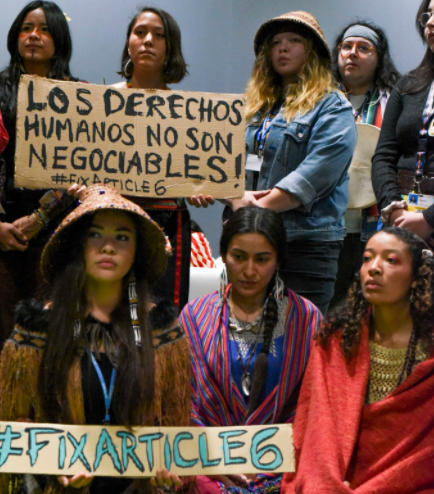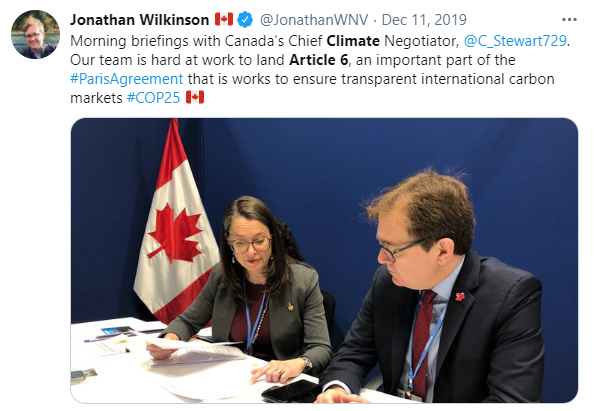Article by PBI-Canada

Protest at COP25 in Madrid. Ta’Kaiya Blaney of the Tla A’min Nation (in Canada) is holding the #FixArticle6 sign. Photo by Haylee Koroi.
The Paris Agreement reached at the United Nations COP21 climate summit in December 2015 includes this reference to human rights in the preamble:
“Parties should, when taking action to address climate change, respect, promote, and consider their respective obligations on human rights, the right to health, the rights of indigenous peoples, local communities, migrants, children, persons with disabilities, and people in vulnerable situations and the right to development, as well as gender equality, empowerment of women and intergenerational equity.”
This is the only reference to human rights in the Paris Agreement (it doesn’t appear in its key operative provisions) and reportedly even then there was an effort to remove it.
Human rights have also notably emerged in the negotiations related to Article 6, which contains three key subsections:
Article 6.2: This would allow countries to strike bilateral and voluntary agreements to trade carbon units (broadly referred to as internationally traded mitigation outcomes).
Article 6.4: This would create a centralized governance system for countries and the private sector to trade emission units in a system known as the Sustainable Development Mechanism (referred to as a carbon market).
Article 6.8: This would develop a framework for cooperation between countries to reduce emissions outside market mechanisms, such as development aid.
Significantly, the Sustainable Development Mechanism (SDM) in Article 6.4 is the successor to the Clean Development Mechanism (CDM) in the Kyoto Protocol.
The CDM has been linked to human rights violations because it allows countries to ‘reduce’ their carbon emissions by buying offsets from projects, notably major hydroelectric dams that displace communities and harm the environment.
The Indigenous Environmental Network has stated: “After decades of carbon trading failure, dispossession, and human rights abuses, the continuation of market-based neoliberal policies for climate change must end now.”
It has also been argued that Article 6.4 needs to include language on human rights, requirements to consult impacted communities, and grievance mechanisms.
But during the discussions at COP25 in 2019 in Madrid on Article 6.4, some parties opposed the inclusion of human rights references.
While initial language for 6.4 noted that countries should “respect, promote and consider their respective obligations on human rights” that was replaced with text noting the need for countries to address “negative social and environmental impacts.”
On this crucial point relating to Article 6, the Center for International and Environmental Law (CIEL) has cautioned: “When those rules do not adequately safeguard human rights and the environment, the damages can be significant.”
Article 6 is scheduled to be discussed again at COP26 in Glasgow this November.
At COP25, Mary Robinson, the former UN High Commissioner for human rights, stated: “Human rights and gender equity are at the heart of what we are talking about on the climate. If we don’t have these issues included, we are going to make enormous mistakes.”
In the lead up to COP26, PBI-Canada has also been amplifying the UN Human Rights Council resolution that affirms: “Human rights defenders, including environmental human rights defenders, must be ensured a safe and enabling environment to undertake their work free from hindrance and insecurity, in recognition of their important role in supporting States to fulfill their obligations under the Paris Agreement.”
Given four environmental defenders have been killed every week on average since the Paris Agreement was reached in December 2015, we feel it is imperative that the role of the defenders on the frontlines of the climate crisis is recognized at COP26.
Tweet from Jonathan Wilkinson, Canada’s Minister of the Environment and Climate Change:

